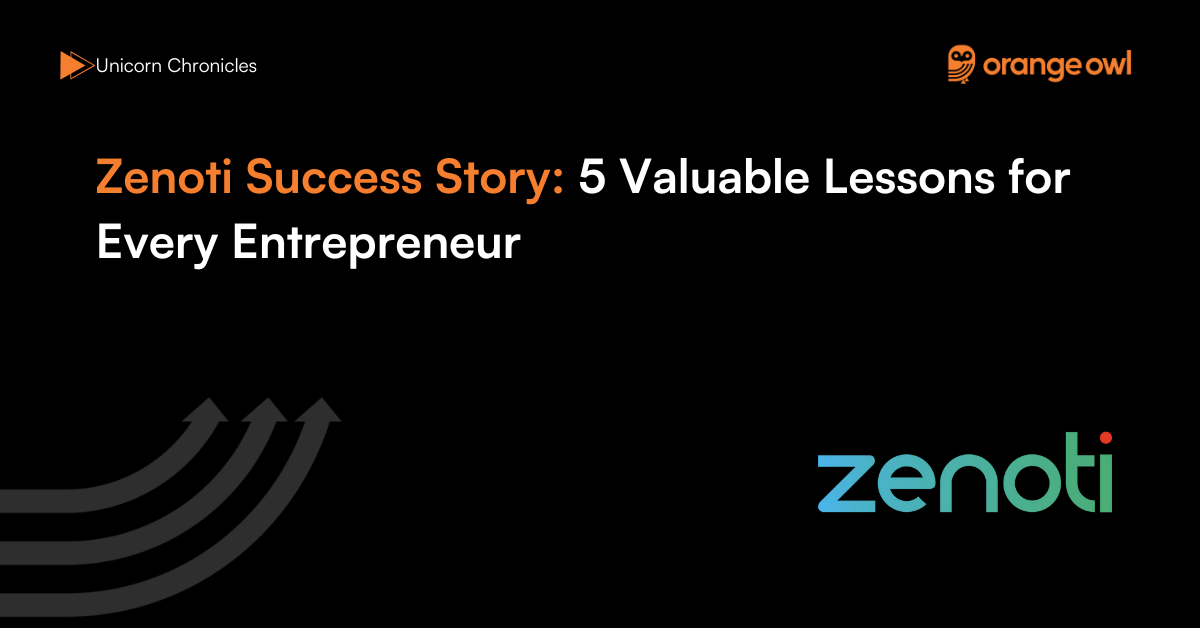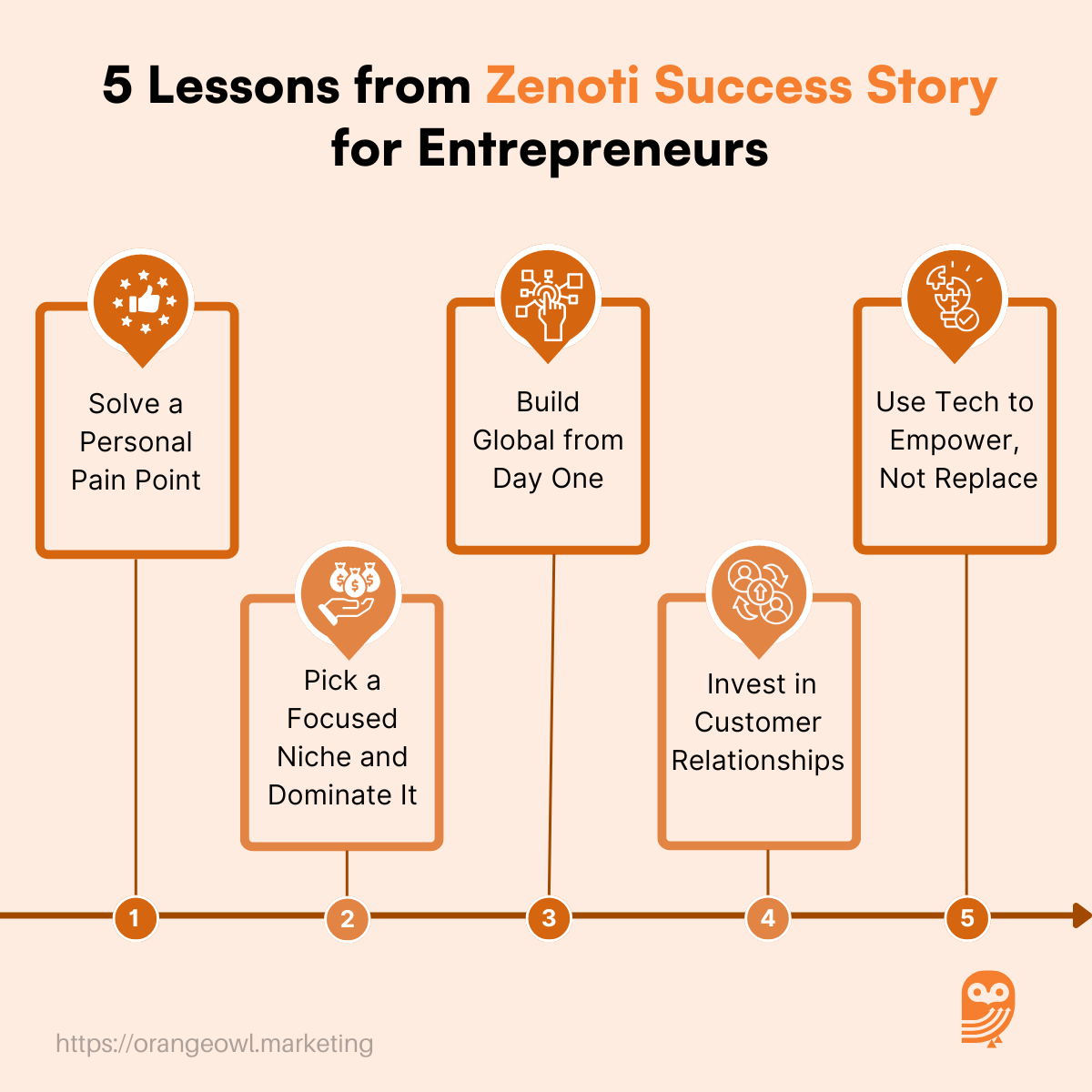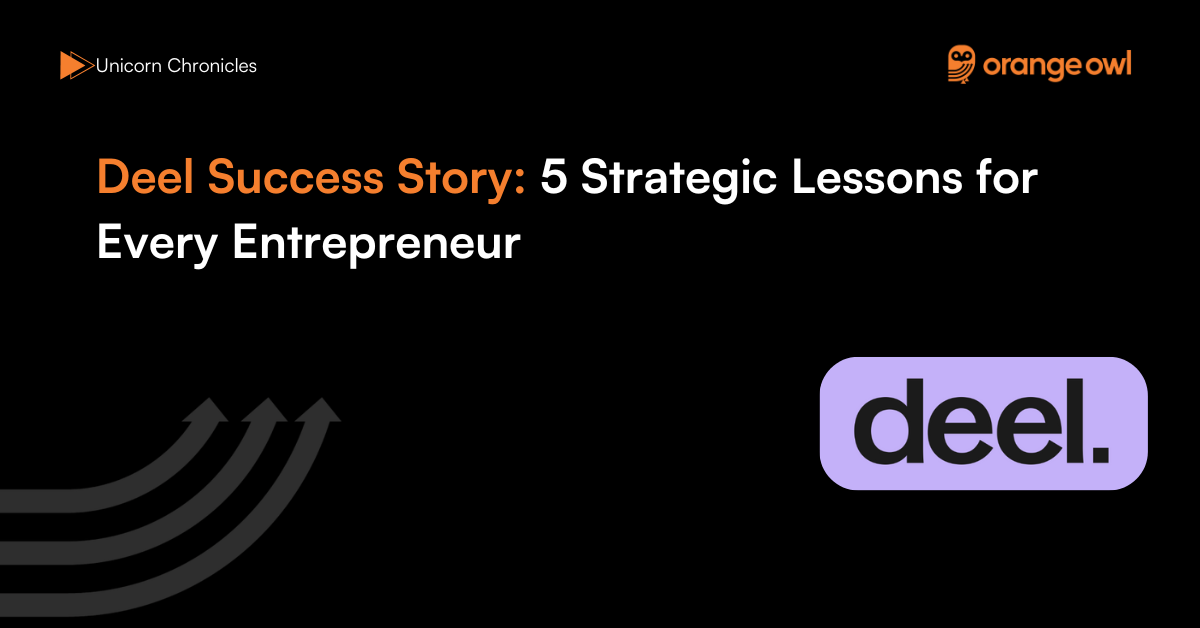Zenoti Success Story: 5 Valuable Lessons for Every Entrepreneur
Vivek Goel
April 29, 2025

Table of Contents
Introduction
In the thriving $5.3 trillion wellness and beauty industry, Zenoti has emerged as a global SaaS leader, revolutionizing how spas, salons, and fitness centers manage operations and customer experiences. Founded in 2010 by Sudheer Koneru, Zenoti was born out of a personal need and scaled into a unicorn valued at over $1.5 billion. Headquartered in Bellevue, Washington, with a strong operational base in India, Zenoti now serves over 15,000 businesses in more than 50 countries. Brands like Toni & Guy, Massage Heights, and European Wax Center trust Zenoti to power their digital transformation.
“Our goal was simple: to give wellness and beauty businesses the kind of software powerhouses like Amazon or Uber have.” — Sudheer Koneru, Co-founder & CEO, Zenoti
Zenoti’s journey is a compelling blueprint for entrepreneurs aiming to build vertically focused, globally scalable software solutions.
Origin Story
The inception of Zenoti wasn’t born in a boardroom—it was born in a spa. Sudheer Koneru, a tech veteran with stints at Microsoft and co-founder experience at Intelliprep (which merged with Blackboard), had returned to India to manage his family’s chain of wellness centers. What he encountered was a glaring gap: fragmented systems, paper-based processes, and zero customer intelligence.
“I saw the same problem every spa and salon faced—no integrated system, no way to scale, and zero customer intelligence. That’s when we decided to fix it.” — Sudheer Koneru, Co-founder & CEO, Zenoti
Despite the booming demand for personal wellness and self-care services, the underlying business technology was outdated and disjointed. Sudheer realized that while giants like Amazon and Uber were leveraging tech to delight users and optimize operations, salons and spas were stuck in the dark ages. The beauty and wellness industry, despite being a $5.3 trillion global market, was vastly underserved when it came to sophisticated enterprise software.
Armed with this insight and his deep technical expertise, Sudheer launched Zenoti in 2010 as a full-stack cloud solution tailored specifically for wellness businesses. From online booking, point-of-sale, and staff management to CRM, marketing automation, and analytics, Zenoti aimed to be a single platform that could power the entire customer journey.
Unlike generic software tools, Zenoti was built from the ground up with domain specificity—every feature designed to meet the unique operational and customer engagement needs of the wellness sector. It wasn’t just about digitizing the salon—it was about transforming it.
“We didn’t want to just build software; we wanted to elevate the entire guest experience and empower businesses to scale intelligently.” — Sudheer Koneru
This founder-led commitment to solving a real, overlooked problem laid the foundation for Zenoti’s rise from a niche SaaS tool to a global enterprise solution powering thousands of brands across more than 50 countries.
Business Landscape and Early Challenges
Cracking into the fragmented and largely unorganized wellness and beauty sector posed a serious uphill battle. When Zenoti launched, most spas and salons around the world were still operating on legacy desktop software—or worse, manual records and Excel sheets. These businesses had rarely seen tech as a growth driver. For them, software was an expense, not an investment.
“We had to first change mindsets—these business owners didn’t wake up wanting software. They wanted to grow, and we showed them how tech could get them there.” — Sudheer Koneru, Co-founder & CEO, Zenoti
Zenoti’s team had to take on the role of educators as much as product builders. Convincing small and mid-sized business owners to move to the cloud, embrace automation, and trust their customer data to a software platform required immense trust-building. The company leaned heavily on demonstrating value through pilot programs, case studies, and data-backed ROI conversations.
Early adopters began to see results—higher repeat bookings, improved operational efficiency, and better customer retention. That success gave Zenoti the social proof it needed to penetrate deeper into the market.
As Zenoti looked beyond India to expand globally, the complexity grew. The wellness industry is hyper-localized, and entering new markets came with its own set of operational challenges—localized taxation norms, different digital payment methods, customer preferences, and regulatory hurdles.
“We had to rethink our architecture to make sure we could customize at scale. Every country had its quirks—so we designed Zenoti to be flexible from the start.” — Sudheer Koneru
To solve this, Zenoti built a modular platform that could adapt to various business environments while still offering a consistent user experience. Their engineering foresight, combined with customer empathy, allowed Zenoti to scale into over 50 countries with minimal friction.
Growth Strategies
Zenoti’s growth wasn’t accidental—it was the result of clear vision, disciplined execution, and a relentless focus on solving real business problems. Initially, Zenoti focused on perfecting its product with a handful of wellness centers in India, ironing out the complex needs of multi-location businesses. Once they had strong product-market fit, they set their sights globally.
“We didn’t want to be another horizontal SaaS company. Our goal was to dominate one vertical and do it better than anyone else.” — Sudheer Koneru
This vertical SaaS approach allowed Zenoti to go deep, offering not just generic features but tools tailored specifically to wellness and beauty businesses—like waitlist management, therapist optimization, and revenue per square foot analytics. This specialization made Zenoti indispensable to their users.
To support global scaling, Zenoti raised strategic funding at key stages:
- In 2020, the company raised $160 million in a Series D round led by Advent International, valuing it at $1.5 billion, making Zenoti India’s first SaaS unicorn in the beauty and wellness vertical.
- The funding helped them expand into the U.S., Europe, Southeast Asia, and the Middle East, and enabled deeper investments in AI, automation, and user experience.
Zenoti also adopted a customer success-driven approach. Instead of focusing only on acquisition, they dedicated resources to helping businesses onboard smoothly, understand the data, and grow their revenue. This created high retention and strong word-of-mouth referrals in the tight-knit salon and spa industry.
Marketing Strategies
Zenoti’s marketing strategy mirrored its product ethos—focused, community-driven, and empowering. Understanding that salon and spa owners don’t speak the same language as traditional tech buyers, Zenoti prioritize education over hard selling.
“Most of our clients aren’t technologists. We had to speak in their language—about bookings, customer satisfaction, revenue per chair—not cloud infrastructure.” — Sudheer Koneru
Here are key pillars of their marketing playbook:
- Industry-Specific Content: Zenoti built a large library of resources—blogs, whitepapers, webinars, and success stories—targeted specifically to salon owners, spa managers, and fitness center operators.
- Customer Evangelism: Instead of paid influencer marketing, Zenoti empowered happy clients to share their success stories. Word-of-mouth became a powerful acquisition engine.
- Events & Communities: Zenoti hosted user conferences, sponsored wellness industry expos, and supported local training programs to stay deeply embedded in the community.
- Product-Led Growth: A seamless demo experience and strong in-product onboarding allowed Zenoti to win over even skeptical users. Many clients started small and scaled to multi-location usage organically.
Zenoti also invested in AI-driven personalization and analytics, helping clients identify underperforming services, automate upsells, and optimize staff productivity. This showed the real, bottom-line impact of their platform—turning their marketing into a value demonstration.
5 Powerful Lessons Every Entrepreneur Should Learn from Zenoti
1. Solve a Personal Pain Point
Zenoti wasn’t born out of market research—it was born from a real-life operational frustration. Sudheer Koneru faced the inefficiencies of running his family’s spa chain firsthand. From disjointed appointment systems to the lack of real-time analytics, every bottleneck became a blueprint for what Zenoti needed to fix.
“When you live the pain, you build with clarity. That clarity is what helped us create real value for our customers.” — Sudheer Koneru
By solving a problem he deeply understood, Sudheer ensured Zenoti’s product was both intuitive and aligned with industry needs—something every founder should strive for.
2. Pick a Focused Niche and Dominate It
Rather than trying to serve all industries, Zenoti zeroed in on the underserved wellness and beauty sector. This niche focus gave them a massive competitive advantage—they could go deep instead of wide.
From salon-specific workflows to features like therapist performance analytics and waitlist management, Zenoti built capabilities that generic software platforms couldn’t match.
“We saw riches in niches. Our idea was never to be broad, but to be the best in one vertical.” — Sudheer Koneru
Their vertical SaaS strategy is a masterclass in how entrepreneurs can win big by serving a narrow market with depth and precision.

3. Build Global from Day One
Zenoti was designed for global scalability from the ground up. Their platform supported multiple languages, time zones, tax systems, and currencies—long before they had clients in all these geographies.
This early commitment to localization helped Zenoti quickly expand to over 50 countries, serving both boutique studios and multi-national chains.
“You can’t build global software as an afterthought. You build it with the world in mind, or you’ll always be catching up.” — Sudheer Koneru
Startups aiming for international growth can learn from Zenoti’s forward-thinking product architecture and operational planning.
4. Invest in Customer Relationships
Zenoti didn’t just close deals—they built partnerships. Their customer success teams played a vital role in helping businesses onboard effectively, adopt features, and maximize ROI.
This long-term approach paid off. With strong Net Promoter Scores (NPS) and high retention rates, Zenoti turned clients into evangelists—leading to referrals, testimonials, and deep loyalty.
“We win when our customers win. That mindset shaped how we built our teams and our culture.” — Sudheer Koneru
Focusing on post-sale relationships is a lesson every SaaS founder should prioritize to build sustainable growth.
5. Use Tech to Empower, Not Replace
Unlike many tech solutions that aim to disrupt or displace traditional businesses, Zenoti took a different route—it empowered them. Their platform simplified operations, boosted staff productivity, and helped business owners track metrics that truly mattered.
This approach positioned Zenoti as a trusted partner rather than a threat, increasing user adoption and trust.
“Technology should amplify people—not push them out. That belief is at the core of everything we build.” — Sudheer Koneru
Entrepreneurs can take inspiration from this ethos, especially when building products in sectors rooted in human interaction.
Conclusion: Key Takeaways from Zenoti’s Journey
Zenoti’s journey—from a personal frustration in managing family-run spas to becoming a billion-dollar global SaaS leader—demonstrates the immense potential of building software with empathy, clarity, and focus. Sudheer Koneru didn’t stumble upon an idea; he lived it, understood it deeply, and then built a solution that transformed an entire industry.
By targeting a highly fragmented and traditionally low-tech sector, Zenoti exemplified the power of niche domination. Their approach wasn’t about disruption for the sake of innovation—it was about genuinely empowering wellness and beauty businesses to operate at scale, improve customer experiences, and make smarter decisions through data.
“Real innovation doesn’t just digitize a process—it elevates it.” — Sudheer Koneru
For entrepreneurs, Zenoti’s story offers timeless lessons: Solve a problem you know intimately. Focus on a specific vertical and become indispensable. Prioritize long-term relationships over quick wins. And above all, use technology as a tool for empowerment—not just efficiency.
In a world racing toward automation and digitization, Zenoti reminds us that true success lies in building with heart, purpose, and an unwavering commitment to the people you serve. It didn’t just ride the wave of digital transformation—it helped define what the future of service businesses should look like.


